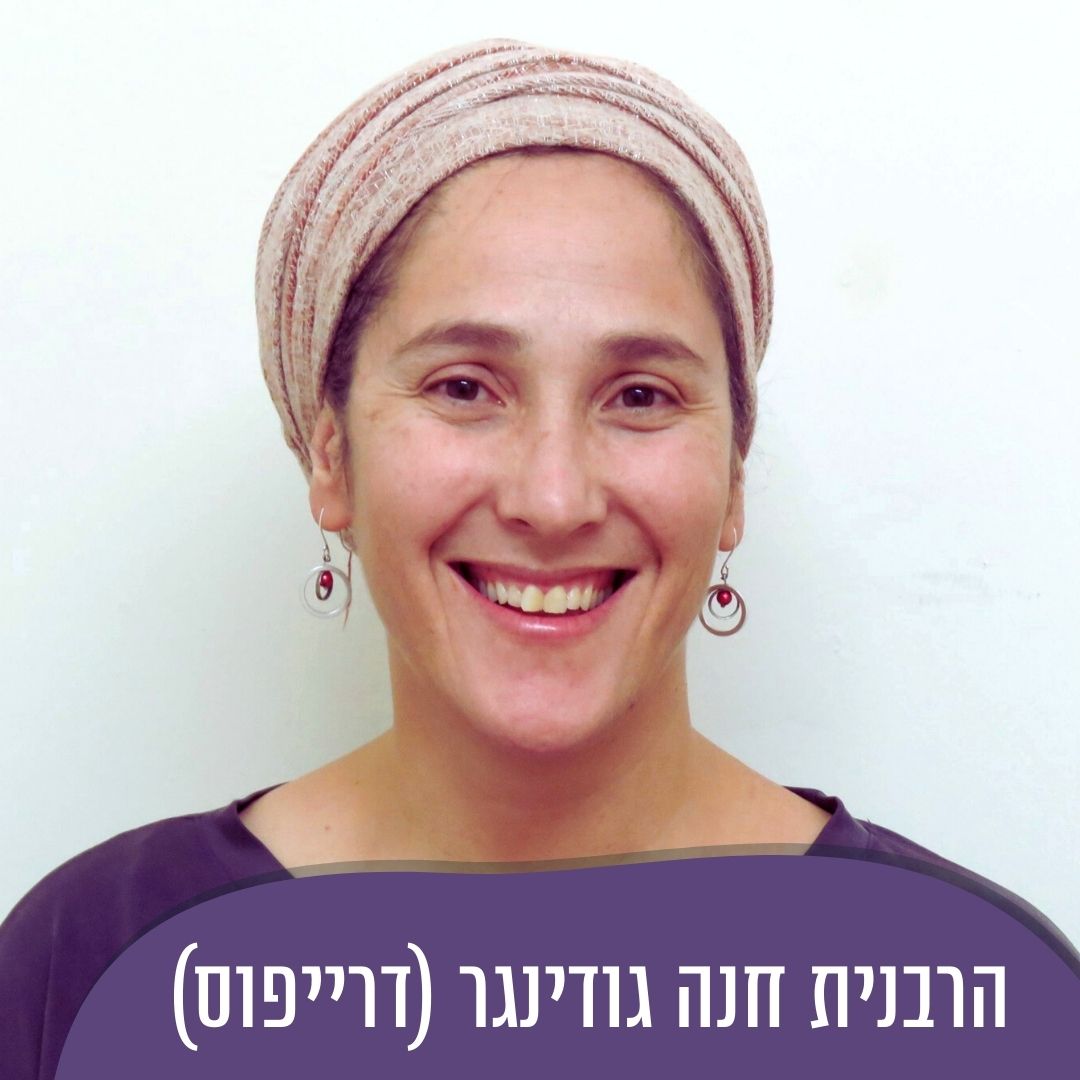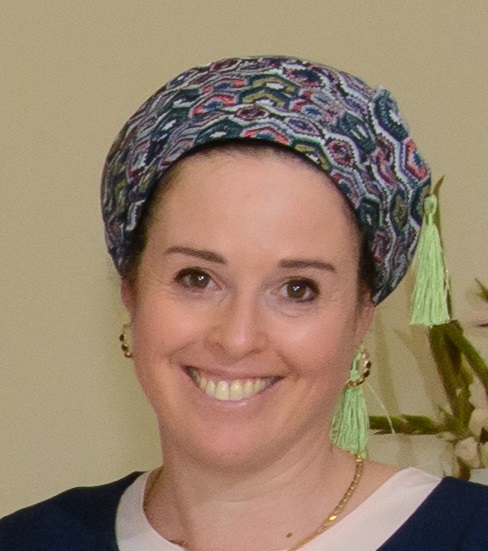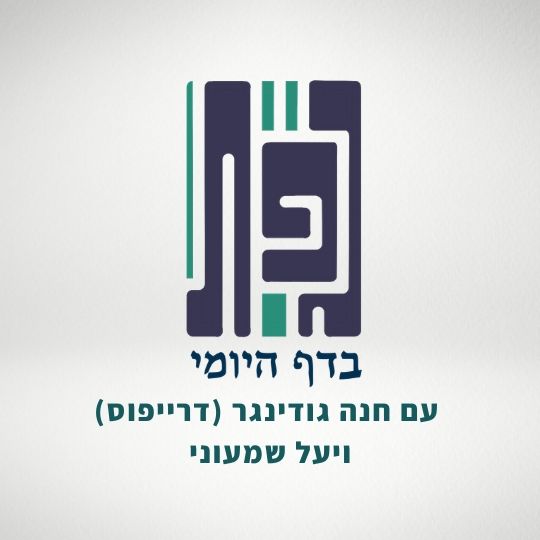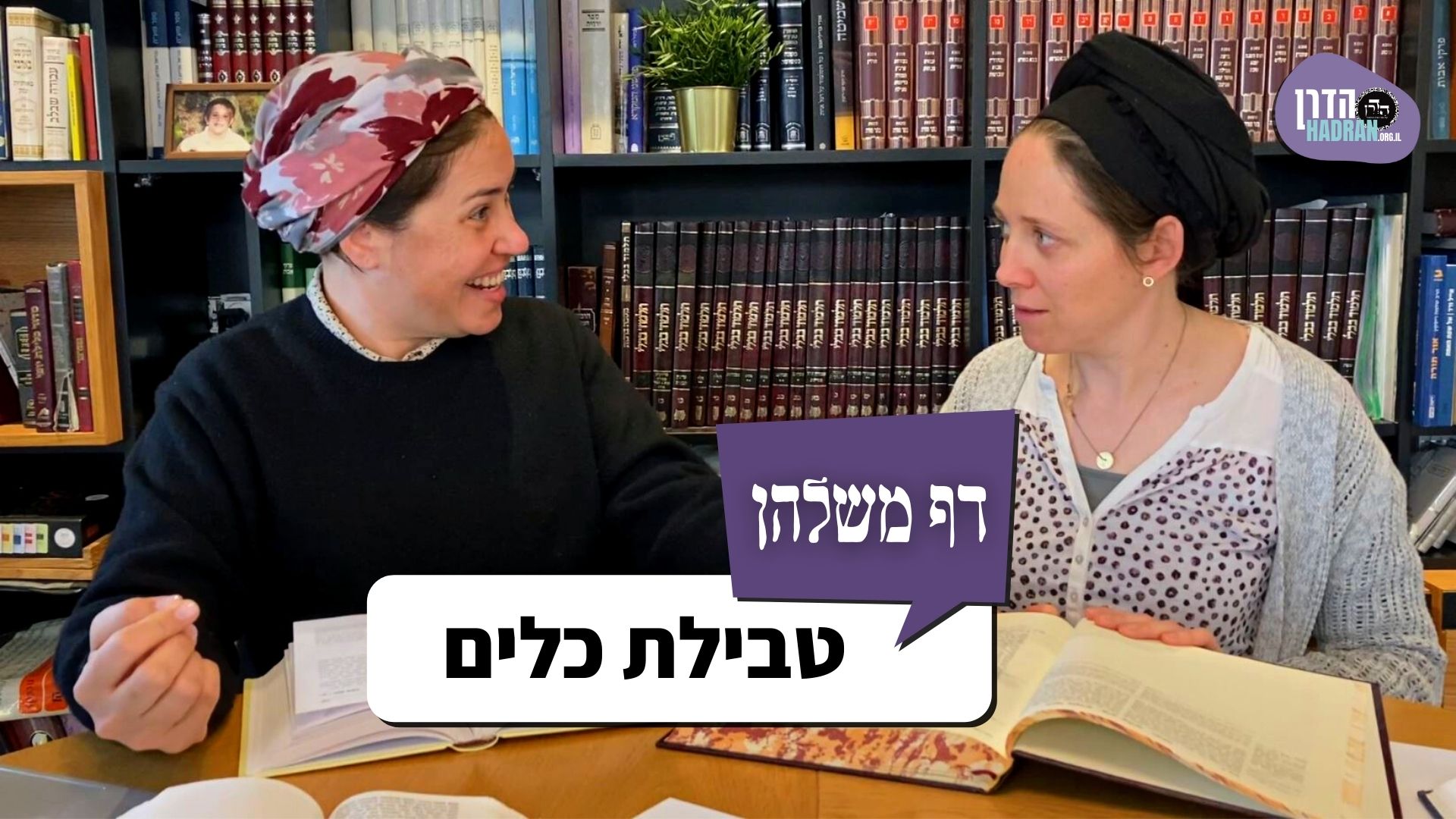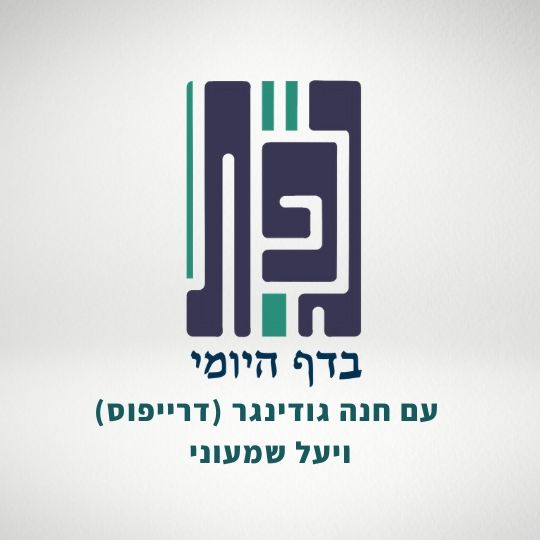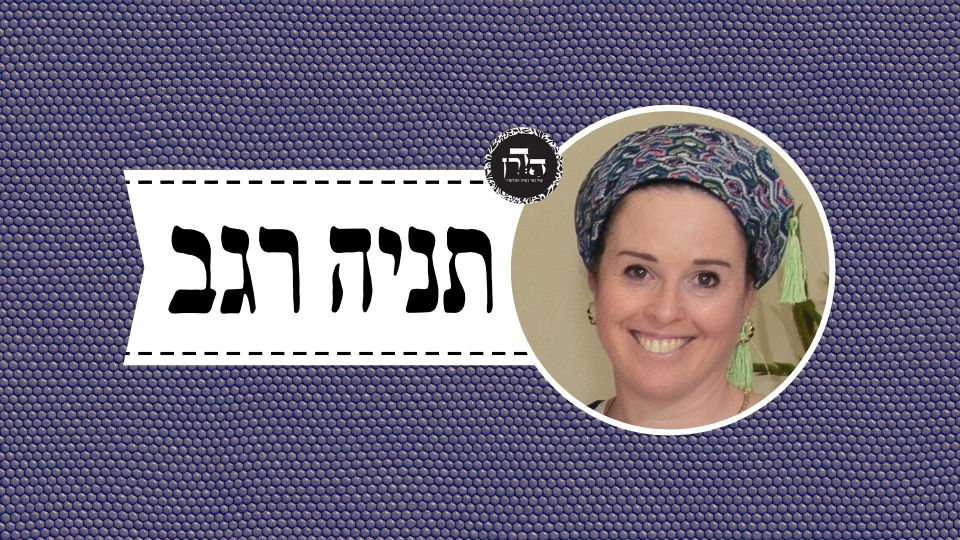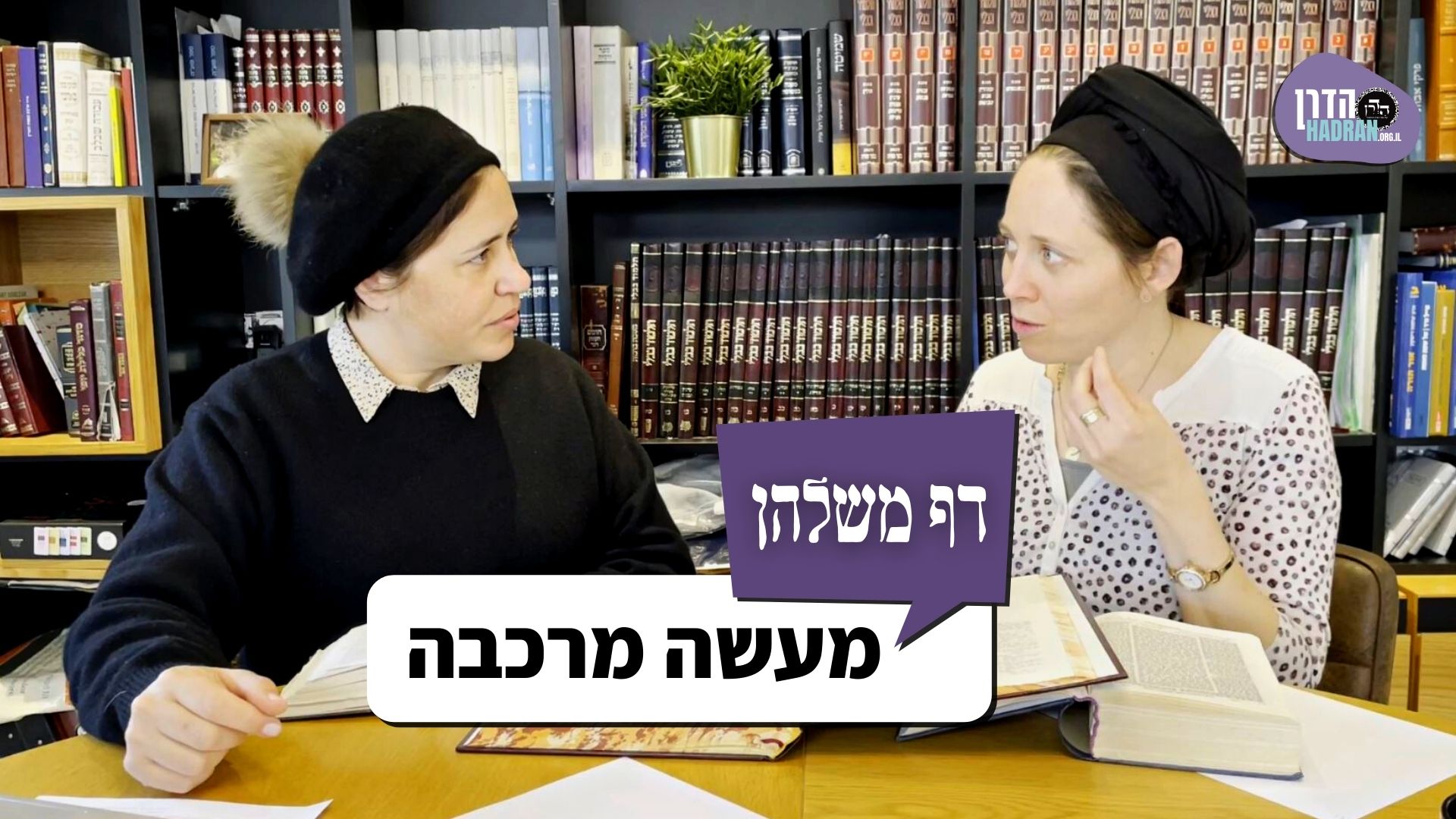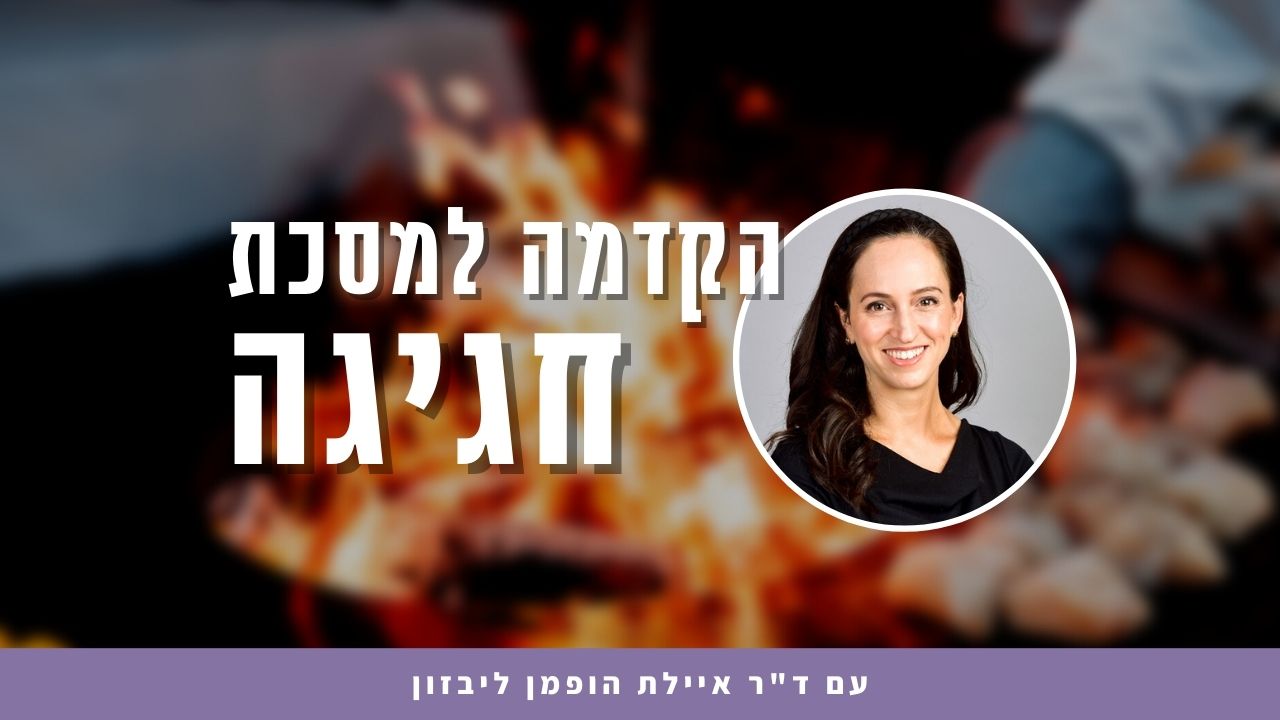חגיגה יח
לָא יָדַעְנָא כַּמָּה, קָא מַשְׁמַע לַן דְּרַבִּי אֶלְעָזָר אָמַר רַבִּי אוֹשַׁעְיָא.
I would not know how many days of redress there are. The Gemara therefore teaches us, from the statement that Rabbi Elazar said that Rabbi Oshaya said, that there are seven days of redress.
וְרֵישׁ לָקִישׁ אָמַר: ״וְחַג הַקָּצִיר״, אֵיזֶהוּ חַג שֶׁאַתָּה חוֹגֵג וְקוֹצֵר בּוֹ — הֱוֵי אוֹמֵר זֶה עֲצֶרֶת. אֵימַת? אִילֵּימָא בְּיוֹם טוֹב — קְצִירָה בְּיוֹם טוֹב מִי שְׁרֵי? אֶלָּא לָאו לְתַשְׁלוּמִין.
And Reish Lakish said, providing a different proof: From the very name of the day: “And the Festival of harvest” (Exodus 23:16), we can learn the following: On which Festival do you celebrate and harvest? You must say it is Shavuot. When exactly does this apply? If we say that it is on the Festival day itself, is harvesting permitted on a Festival? Rather, is it not referring to the day of redress?
אָמַר רַבִּי יוֹחָנָן: אֶלָּא מֵעַתָּה, ״חַג הָאָסִיף״: אֵי זֶהוּ חַג שֶׁיֵּשׁ בּוֹ אֲסִיפָה — הֱוֵי אוֹמֵר זֶה חַג הַסּוּכּוֹת, אֵימַת? אִילֵּימָא בְּיוֹם טוֹב — מְלָאכָה בְּיוֹם טוֹב מִי שְׁרֵי? אֶלָּא בְּחוּלּוֹ שֶׁל מוֹעֵד. חוּלּוֹ שֶׁל מוֹעֵד מִי שְׁרֵי? אֶלָּא — חַג הַבָּא בִּזְמַן אֲסִיפָה, הָכָא נָמֵי — חַג הַבָּא בִּזְמַן קְצִירָה.
Rabbi Yoḥanan said to Reish Lakish: However, if that is so, you should likewise say with regard to “the Festival of gathering” (Exodus 23:16): On which Festival is there gathering? You must say it is the festival of Sukkot. When exactly? If we say it is on the Festival day itself, is labor permitted on a Festival? Rather, it is referring to the intermediate Festival days. But on the intermediate Festival days, too, is it permitted? One may perform only work that, if neglected, would result in irretrievable loss. Rather, you must explain that “the Festival of gathering” is referring to the season of the year, i.e., the Festival that occurs during the time of gathering. Here too: “The Festival of harvest” means a Festival that occurs during the time of harvest.
מִכְּלָל דְּתַרְוַיְיהוּ סְבִירָא לְהוּ דְּחוּלּוֹ שֶׁל מוֹעֵד אָסוּר בַּעֲשִׂיַּית מְלָאכָה.
§ The Gemara comments: Since Reish Lakish does not dispute the accuracy of Rabbi Yoḥanan’s statement, it may be inferred from their statements that both of them hold that the performance of labor during the intermediate Festival days is prohibited by the Torah.
מְנָהָנֵי מִילֵּי? דְּתָנוּ רַבָּנַן: ״אֶת חַג הַמַּצּוֹת תִּשְׁמוֹר שִׁבְעַת יָמִים״ — לִימֵּד עַל חוּלּוֹ שֶׁל מוֹעֵד שֶׁאָסוּר בַּעֲשִׂיַּית מְלָאכָה, דִּבְרֵי רַבִּי יֹאשִׁיָּה. רַבִּי יוֹנָתָן אוֹמֵר: אֵינוֹ צָרִיךְ, קַל וָחוֹמֶר: וּמָה רִאשׁוֹן וּשְׁבִיעִי שֶׁאֵין קְדוּשָּׁה לִפְנֵיהֶן וּלְאַחֲרֵיהֶן — אָסוּר בַּעֲשִׂיַּית מְלָאכָה, חוּלּוֹ שֶׁל מוֹעֵד שֶׁיֵּשׁ קְדוּשָּׁה לִפְנֵיהֶן וּלְאַחֲרֵיהֶן — אֵינוֹ דִּין שֶׁיְּהֵא אָסוּר בַּעֲשִׂיַּית מְלָאכָה.
The Gemara proceeds to ask: From where are these matters derived; what is the biblical source for this prohibition? As the Sages taught: “You shall observe the festival of Passover seven days” (Exodus 23:15). This teaches that the performance of labor is prohibited during the intermediate Festival days, as “observe” denotes a negative commandment; this is the statement of Rabbi Yoshiyya. Rabbi Yonatan says: This proof is not necessary, as it does not accord with the straightforward meaning of the verse. Rather, it is learned from an a fortiori inference, as follows: If the performance of labor on the first and seventh days of Passover, which are not preceded and followed by sanctity as the days before the first day and after the seventh day are weekdays, is nevertheless prohibited, is it not right that on the days of the intermediate Festival days, which are preceded and followed by sanctity, i.e., the first and last days of the Festival, the performance of labor should be prohibited?
שֵׁשֶׁת יְמֵי בְרֵאשִׁית יוֹכִיחוּ, שֶׁיֵּשׁ קְדוּשָּׁה לִפְנֵיהֶן וּלְאַחֲרֵיהֶן, וּמוּתָּרִין בַּעֲשִׂיַּית מְלָאכָה! מָה לְשֵׁשֶׁת יְמֵי בְּרֵאשִׁית שֶׁאֵין בָּהֶן קׇרְבַּן מוּסַף, תֹּאמַר בְּחוּלּוֹ שֶׁל מוֹעֵד שֶׁיֵּשׁ בּוֹ קׇרְבַּן מוּסַף. רֹאשׁ חֹדֶשׁ יוֹכִיחַ, שֶׁיֵּשׁ בּוֹ קׇרְבַּן מוּסַף, וּמוּתָּר בַּעֲשִׂיַּית מְלָאכָה! מָה לְרֹאשׁ חֹדֶשׁ שֶׁאֵין קָרוּי ״מִקְרָא קֹדֶשׁ״, תֹּאמַר בְּחוּלּוֹ שֶׁל מוֹעֵד שֶׁקָּרוּי ״מִקְרָא קֹדֶשׁ״, הוֹאִיל וְקָרוּי ״מִקְרָא קֹדֶשׁ״ — דִּין הוּא שֶׁאָסוּר בַּעֲשִׂיַּית מְלָאכָה.
The Gemara questions this conclusion: The six days of Creation, i.e., the days of the week, shall prove this, since they are preceded and followed by the sanctity of Shabbat, and yet the performance of labor on them is permitted. The Gemara rejects this difficulty: What of the fact that the six days of Creation are regular weekdays on which there is no additional offering; can you say the same with regard to the intermediate Festival days, on which there is an additional offering, bestowing these days with a measure of sanctity? The Gemara counters this: The New Moon shall prove this, since it has an additional offering, and the performance of labor is nevertheless permitted on it. The Gemara refutes this argument: What of the fact that the New Moon is not called “a holy convocation”; can you say the same with regard to the intermediate Festival days, which are called “a holy convocation”? Since they are called “a holy convocation” it is logical that the performance of labor should be prohibited on them.
תַּנְיָא אִידַּךְ: ״כׇּל מְלֶאכֶת עֲבוֹדָה לֹא תַעֲשׂוּ״ — לִימֵּד עַל חוּלּוֹ שֶׁל מוֹעֵד שֶׁאָסוּר בַּעֲשִׂיַּית מְלָאכָה, דִּבְרֵי רַבִּי יוֹסֵי הַגְּלִילִי. רַבִּי עֲקִיבָא אוֹמֵר: אֵינוֹ צָרִיךְ, הֲרֵי הוּא אוֹמֵר: ״אֵלֶּה מוֹעֲדֵי ה׳ וְגוֹ׳״. בַּמָּה הַכָּתוּב מְדַבֵּר? אִם בָּרִאשׁוֹן — הֲרֵי כְּבָר נֶאֱמַר ״שַׁבָּתוֹן״, אִם בַּשְּׁבִיעִי — הֲרֵי כְּבָר נֶאֱמַר ״שַׁבָּתוֹן״. הָא אֵין הַכָּתוּב מְדַבֵּר אֶלָּא בְּחוּלּוֹ שֶׁל מוֹעֵד, לְלַמֶּדְךָ שֶׁאָסוּר בַּעֲשִׂיַּית מְלָאכָה.
It is taught in another baraita concerning the same topic: With regard to the first day of Passover and Sukkot, the verse states: “You shall do no kind of laborious work” (Leviticus 23:35), followed by “seven days, you shall bring an offering made by fire to the Lord,” which teaches that the performance of labor is prohibited during the intermediate Festival days; this is the statement of Rabbi Yosei the Galilean. Rabbi Akiva says: This is not necessary, since it is stated earlier in that chapter: “These are the appointed Festivals of the Lord, holy convocations, which you shall proclaim in their appointed season” (Leviticus 23:4). With regard to what is the verse speaking? If it is referring to the first day of the Festival, it has already explicitly stated “a solemn rest” (Leviticus 23:39) with regard to that day; if it is referring to the seventh, it has already stated “a solemn rest” (Leviticus 23:39) with regard to that day as well. Therefore, the verse can be speaking only of the intermediate Festival days, teaching you that the performance of labor is prohibited on them.
תַּנְיָא אִידַּךְ: ״שֵׁשֶׁת יָמִים תֹּאכַל מַצּוֹת וּבַיּוֹם הַשְּׁבִיעִי עֲצֶרֶת לַה׳״, מָה שְׁבִיעִי עָצוּר — אַף שֵׁשֶׁת יָמִים עֲצוּרִין. אִי: מָה שְׁבִיעִי עָצוּר בְּכׇל מְלָאכָה — אַף שֵׁשֶׁת יָמִים עֲצוּרִין בְּכׇל מְלָאכָה.
It is taught in another baraita: The verse states: “Six days you shall eat unleavened bread, and on the seventh day there shall be a solemn assembly for the Lord your God; on it, you shall do no work” (Deuteronomy 16:8). If so, just as the seventh day of the Festival is precluded from the performance of labor, so are the six intermediate Festival days precluded, since the word “and” in the phrase “and on the seventh day” connects it to the previous days. If so, perhaps: Just as the seventh day is precluded from the performance of all labor, so too the six intermediate days are precluded from the performance of all labor, even those whose performance prevents irretrievable loss.
תַּלְמוּד לוֹמַר: ״וּבַיּוֹם הַשְּׁבִיעִי עֲצֶרֶת״, הַשְּׁבִיעִי עָצוּר בְּכׇל מְלָאכָה, וְאֵין שִׁשָּׁה יָמִים עֲצוּרִין בְּכׇל מְלָאכָה. הָא לֹא מְסָרָן הַכָּתוּב אֶלָּא לַחֲכָמִים, לוֹמַר לָךְ אֵי זֶה יוֹם אָסוּר וְאֵי זֶה יוֹם מוּתָּר, אֵי זוֹ מְלָאכָה אֲסוּרָה וְאֵי זוֹ מְלָאכָה מוּתֶּרֶת.
The verse therefore states: “And on the seventh day there shall be a solemn assembly,” literally, pause. This indicates that the seventh day alone is precluded from the performance of all labor, but the other six days are not precluded from the performance of all labor but only from certain forms of work. Since the Bible does not specify which types of work are prohibited, the verse has therefore entrusted the matter to the Sages exclusively, to tell you on which day work is prohibited and on which day it is permitted, and similarly which labor is prohibited and which labor is permitted.
וּמוּתָּרִין בְּהֶסְפֵּד וְתַעֲנִית, שֶׁלֹּא לְקַיֵּים אֶת דִּבְרֵי הָאוֹמְרִין עֲצֶרֶת אַחַר הַשַּׁבָּת. וְהָאִיתְּמַר: מַעֲשֶׂה וּמֵת אֲלֶכְּסָא בְּלוֹד, וְנִכְנְסוּ כׇּל יִשְׂרָאֵל לְסוֹפְדוֹ, וְלֹא הִנִּיחָם רַבִּי טַרְפוֹן, מִפְּנֵי שֶׁיּוֹם טוֹב שֶׁל עֲצֶרֶת הָיָה.
§ The mishna taught: All were permitted to eulogize and fast on the days of slaughter, in order not to uphold the opinion of the Sadducees, who would say: Shavuot must always occur after Shabbat. The Gemara raises a difficulty: But wasn’t it stated: An incident occurred when Alexa died in Lod, and all of Israel gathered to eulogize him, but Rabbi Tarfon would not allow them do so because it was the Festival day of Shavuot?
יוֹם טוֹב סָלְקָא דַּעְתָּךְ? אִי בְּיוֹם טוֹב, מִי קָאָתוּ? אֶלָּא אֵימָא: מִפְּנֵי שֶׁיּוֹם טְבוֹחַ הָיָה! לָא קַשְׁיָא: כָּאן בְּיוֹם טוֹב שֶׁחָל לִהְיוֹת אַחַר הַשַּׁבָּת, כָּאן בְּיוֹם טוֹב שֶׁחָל לִהְיוֹת בְּשַׁבָּת.
The Gemara analyzes this passage: Can it enter your mind to say that it was a Festival day? If it had been a Festival day, would they have come? Certainly they would not have assembled to eulogize someone on the Festival itself. Rather, say that they were prohibited to eulogize because it was the Festival day of slaughter. The Gemara answers: This is not difficult, since here, the incident in Lod, is referring to a Festival that occurs after Shabbat, whose day of slaughter does not fall on a Sunday. The day of slaughter retains a measure of the sanctity of Shavuot through the offering of Festival offerings and should therefore be treated as a Festival. There, however, the mishna is referring to a Festival that occurs on Shabbat. Since in that case the day of slaughter occurs on a Sunday, it cannot be observed as a Festival, in order to counter the view of the Sadducees.
After discussing many issues unrelated to the main topic of the tractate, the Gemara now begins to discuss the topic of ritual purity and will do so for the remainder of the tractate. These halakhot are relevant to the pilgrim Festivals, as all are obligated to purify themselves in order to enter the Temple and sacrifice offerings.
מַתְנִי׳ נוֹטְלִין לַיָּדַיִם לַחוּלִּין וְלַמַּעֲשֵׂר וְלַתְּרוּמָה, וְלַקּוֹדֶשׁ — מַטְבִּילִין. וְלַחַטָּאת — אִם נִטְמְאוּ יָדָיו, נִטְמָא גּוּפוֹ.
MISHNA: One must wash his hands by pouring a quarter-log of water over them before eating non-sacred food, and for tithes and for teruma; but for eating sacrificial food one must immerse one’s hands in purification waters, such as those of a ritual bath. And with regard to one who wishes to touch the purification waters of the red heifer used for sprinkling, concerning which the Sages ordained further measures of sanctity, if one’s hands were rendered impure even by rabbinical ritual impurity, which usually only renders the hands impure, his entire body is rendered impure, and he must immerse himself in a ritual bath.
טָבַל לַחוּלִּין, הוּחְזַק לַחוּלִּין — אָסוּר לַמַּעֲשֵׂר. טָבַל לַמַּעֲשֵׂר, הוּחְזַק לַמַּעֲשֵׂר — אָסוּר לַתְּרוּמָה. טָבַל לַתְּרוּמָה, הוּחְזַק לַתְּרוּמָה — אָסוּר לַקּוֹדֶשׁ. טָבַל לַקּוֹדֶשׁ, הוּחְזַק לַקּוֹדֶשׁ — אָסוּר לַחַטָּאת. טָבַל לֶחָמוּר — מוּתָּר לַקַּל. טָבַל וְלֹא הוּחְזַק — כְּאִילּוּ לֹא טָבַל.
The mishna continues to list additional differences between various levels of ritual purity: If one immersed for the purpose of eating non-sacred food, he assumes a presumptive status of ritual purity for non-sacred food, and it is prohibited for him to eat tithes, as he did not purify himself with the intention of eating tithes. If one immersed to eat tithes, he assumes a presumptive status for tithes, but he is prohibited from eating teruma. If one immersed for teruma, he assumes a presumptive status for teruma, but he is prohibited from eating sacrificial food. If he immersed for sacrificial food, he assumes a presumptive status for sacrificial food, but he is prohibited from coming in contact with the purification waters. The principle is as follows: One who immersed to eat a food in a stringent category is permitted to eat a food in a lenient one. Another principle: One who immersed without the intention to assume a presumptive status of ritual purity, i.e., one who immersed but did not intend to purify himself, it is as though he has not immersed at all.
בִּגְדֵי עַם הָאָרֶץ, מִדְרָס לִפְרוּשִׁין. בִּגְדֵי פְרוּשִׁין, מִדְרָס לְאוֹכְלֵי תְרוּמָה. בִּגְדֵי אוֹכְלֵי תְרוּמָה, מִדְרָס לַקּוֹדֶשׁ. בִּגְדֵי קוֹדֶשׁ, מִדְרָס לַחַטָּאת.
The mishna continues: The garments of an am ha’aretz, one who is not careful with regard to the laws of ritual purity, are considered impure with the ritual impurity imparted by the treading of a zav. That is considered a primary level of impurity for individuals who are scrupulous with regard to impurity [perushin]. The garments of perushin are considered impure by the treading of a zav for priests who eat teruma; the garments of those who eat teruma are considered impure by the treading of a zav for those who eat sacrificial food; and likewise the garments of those who eat sacrificial food are considered impure by the treading of a zav for those dealing with the preparation of the purification waters.
יוֹסֵף בֶּן יוֹעֶזֶר הָיָה חָסִיד שֶׁבַּכְּהוּנָּה, וְהָיְתָה מִטְפַּחְתּוֹ מִדְרָס לַקּוֹדֶשׁ. יוֹחָנָן בֶּן גּוּדְגְּדָא הָיָה אוֹכֵל עַל טׇהֳרַת הַקּוֹדֶשׁ כׇּל יָמָיו, וְהָיְתָה מִטְפַּחְתּוֹ מִדְרָס לַחַטָּאת.
The mishna relates: Yosef ben Yo’ezer was the most pious member of the priesthood and was extremely careful to eat teruma in a state of ritual purity, and yet his cloth was considered impure by the treading of a zav for those who ate sacrificial food. Yoḥanan ben Gudgeda would eat non-sacred food while following the laws of ritual purity for sacrificial food all his days, and nevertheless his cloth was considered impure by the treading of a zav for those preparing the purification waters.
גְּמָ׳ חוּלִּין וּמַעֲשֵׂר מִי בָּעוּ נְטִילַת יָדַיִם?
GEMARA: Before discussing the details of the halakhot listed in the mishna, the Gemara poses a basic question: Do non-sacred foods and tithes indeed require washing the hands?
וּרְמִינְהִי: הַתְּרוּמָה וְהַבִּיכּוּרִים חַיָּיבִין עֲלֵיהֶן מִיתָה וָחוֹמֶשׁ, וַאֲסוּרִ[ין] לְזָרִים, וְהֵן נִכְסֵי כֹהֵן. וְעוֹלִין בְּאֶחָד וּמֵאָה, וּטְעוּנִין נְטִילַת יָדַיִם וְהֶעֱרֵב שֶׁמֶשׁ. הֲרֵי אֵלּוּ בִּתְרוּמָה וּבִיכּוּרִים, מָה שֶׁאֵין כֵּן בַּמַּעֲשֵׂר, וְכׇל שֶׁכֵּן בַּחוּלִּין.
The Gemara raises a contradiction to the mishna, from the following mishna in tractate Bikkurim (2:1): With regard to teruma and first fruits, one is liable to the death penalty for them, e.g., if a non-priest ate them intentionally; if he did so unintentionally, he must restore the amount he ate with the addition of a fifth; and they are prohibited to non-priests; and they are the property of the priest. Consequently, a priest can purchase anything he wishes with them, or betroth a woman with them. And if they fell into non-sacred produce and became mixed with it, they are nullified only in a mixture that contains one hundred and one times their amount; and they require washing of the hands and the setting of the sun before they can be eaten, i.e., an impure priest who has immersed at the proper time must still wait for the sun to set before he is fit to eat them. These laws apply to teruma and first fruits, but not to tithes. The mishna adds: And all the more so do they not apply to non-sacred food.
קַשְׁיָא מַעֲשֵׂר אַמַּעֲשֵׂר, קַשְׁיָא חוּלִּין אַחוּלִּין!
This is difficult: The halakha of tithes stated in Bikkurim seems to contradict the halakha of tithes taught in the mishna here, which states that the hands must be washed before tithes are eaten. Additionally, it is difficult with regard to the halakha of non-sacred food, as it contradicts the halakha applicable to non-sacred food stated in the mishna here.
בִּשְׁלָמָא מַעֲשֵׂר אַמַּעֲשֵׂר לָא קַשְׁיָא: הָא רַבִּי מֵאִיר וְהָא רַבָּנַן.
The Gemara comments: Granted, one of the laws with regard to tithes, as opposed to the other law with regard to tithes, is not difficult, since the contradiction can be resolved as follows: This case, the mishna in Bikkurim, is in accordance with Rabbi Meir, while that case, the mishna here, follows the Rabbis.
דִּתְנַן: כׇּל הַטָּעוּן בִּיאַת מַיִם מִדִּבְרֵי סוֹפְרִים — מְטַמֵּא אֶת הַקּוֹדֶשׁ, וּפוֹסֵל אֶת הַתְּרוּמָה, וּמוּתָּר לַחוּלִּין וּלְמַעֲשֵׂר, דִּבְרֵי רַבִּי מֵאִיר. וַחֲכָמִים אוֹסְרִים בְּמַעֲשֵׂר. אֶלָּא חוּלִּין אַחוּלִּין קַשְׁיָא!
As we learned in a mishna (Para 11:5): Anything that requires immersion in water by rabbinic law renders sacrificial food impure. If it touches a consecrated item, the latter is itself rendered impure with a second-degree ritual impurity. It also renders impure any other consecrated object that comes into contact with it with a third-degree ritual impurity and invalidates teruma, meaning that it renders the teruma itself impure, but not to the extent that the teruma can render other teruma impure. And anything that requires immersion in water by rabbinic law is permitted for non-sacred produce and for tithes, meaning that it does not render these items impure, as something impure to such a low degree does not invalidate even non-sacred food. This is the statement of Rabbi Meir. But the Rabbis prohibit this in the case of tithes, meaning that they are invalidated. This source demonstrates that according to the Rabbis, the halakha that applies to tithes differs from that of non-sacred produce, which explains why one must wash his hands for tithes. However, the law with regard to non-sacred food as opposed to the other law of non-sacred food is still difficult.
לָא קַשְׁיָא: כָּאן בַּאֲכִילָה, כָּאן בִּנְגִיעָה.
The Gemara responds: It is not difficult. Here the mishna is referring to eating, before which one must wash his hands. There the mishna in Bikkurim deals with touching alone, for which prior washing of the hands is not necessary.
מַתְקֵיף לַהּ רַב שִׁימִי בַּר אָשֵׁי: עַד כָּאן לָא פְּלִיגִי רַבָּנַן עֲלֵיהּ דְּרַבִּי מֵאִיר אֶלָּא בַּאֲכִילָה דְמַעֲשֵׂר, אֲבָל בִּנְגִיעָה דְמַעֲשֵׂר וּבַאֲכִילָה דְחוּלִּין לָא פְּלִיגִי? אֶלָּא: אִידֵּי וְאִידֵּי בַּאֲכִילָה, וְלָא קַשְׁיָא: כָּאן בַּאֲכִילָה דְנַהֲמָא, כָּאן בַּאֲכִילָה דְפֵירֵי. דְּאָמַר רַב נַחְמָן: כׇּל הַנּוֹטֵל יָדָיו לְפֵירוֹת — הֲרֵי זֶה מִגַּסֵּי הָרוּחַ.
Rav Shimi bar Ashi strongly objects to this: The Rabbis disagree with Rabbi Meir only with regard to eating tithes, but with regard to touching tithes and eating non-sacred food they do not disagree with him. Therefore, the Gemara’s resolution of the difficulty with regard to non-sacred food is not acceptable. Rather, the previous explanation is to be rejected in favor of the following: Both this mishna and that mishna are referring to eating, and it is not difficult: Here the mishna is dealing with eating bread, which requires washing one’s hands, whereas there, in Bikkurim, the mishna is referring to eating non-sacred fruit, for which one need not wash his hands, for Rav Naḥman said: Anyone who washes his hands for fruit is of the haughty of spirit because he shows himself to be more particular than required by the Sages.
תָּנוּ רַבָּנַן: הַנּוֹטֵל יָדָיו, נִתְכַּוֵּון — יָדָיו טְהוֹרוֹת, לֹא נִתְכַּוֵּון — יָדָיו טְמֵאוֹת. וְכֵן הַמַּטְבִּיל יָדָיו, נִתְכַּוֵּון — יָדָיו טְהוֹרוֹת, לֹא נִתְכַּוֵּון — יָדָיו טְמֵאוֹת. וְהָתַנְיָא: בֵּין נִתְכַּוֵּון בֵּין לֹא נִתְכַּוֵּון — יָדָיו טְהוֹרוֹת! אָמַר רַב נַחְמָן, לָא קַשְׁיָא: כָּאן לְחוּלִּין,
§ The Sages taught: One who washes his hands, if he intended to purify them, his hands are pure; if he did not intend to do so, his hands are impure. Similarly, in the case of one who immerses his hands in forty se’a of water, if he intended to purify them, his hands are pure; if he did not so intend, his hands are impure. The Gemara raises a difficulty: But isn’t it taught in a baraita that his hands are pure whether he did or did not intend to purify them? Rav Naḥman said: This is not difficult, as there, the second baraita is referring to non-sacred food, for which one need not have the intention to purify his hands;

